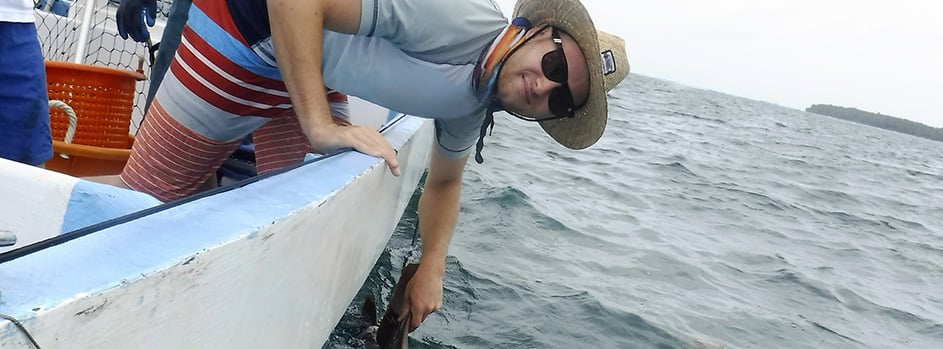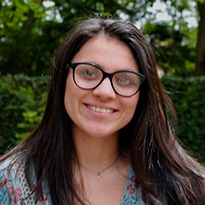BROOKLYN
245 Clinton Ave., Brooklyn, NY 11205
Main: 718.940.5300
Admissions: 718.940.5800
Fax: 718.940.5680
LONG ISLAND
155 W. Roe Blvd., Patchogue, NY 11772
Main: 631.687.5100
Admissions: 631.687.4500
Fax: 631.687.4539

At St. Joseph’s University, we understand how important experiential learning is to our students and to their future employers. That’s why many of our departments offer and/or require students to participate in various internships and service-learning experiences. These opportunities provide young individuals the chance to truly explore the meaning of our five pillars: integrity, intellectual rigor, spiritual depth, social responsibility and service.
Experiential learning can be curricular, meaning that students take credit-bearing courses that require some form of service-learning or applied-learning involvement. It can also be co-curricular, meaning that the involvement is non-credit bearing.
Applied learning allows students the chance to apply what they learn in the classroom to the real world through an internship.
Students have interned at a variety of organizations, such as:
 Elizabeth Knecht ’24
Elizabeth Knecht ’24"My internship was such a fantastic experience! During my internship, I collaborated with many professionals to learn not only the skills needed to prepare myself for my career, but also the skills needed to be a strong and successful leader. The hands-on experience allowed me to truly internalize the impact my career has on others, and it provided clarity into the populations I want to work with."
Service learning links academic study to community service through structured opportunities that encourage students to reflect, communicate and grow, allowing them to explore how they identify with all five pillars of St. Joseph's University.
Service-learning opportunities have included:
 Rebecca Vasquez ’21
Rebecca Vasquez ’21"I think it is so important for students to be involved in these trips in order for them to gain new experiences that push their limits. During the trips, I grew in my faith and stepped out of my comfort zone in many areas — from construction to even just opening up to others."
What's the difference between experiential and applied learning?
Experiential learning is the overarching area that includes options such as applied learning. Applied learning is a form of experiential learning, but specifically relates to students applying what they have learned in a classroom setting to an appropriate real-world environment. Courses such as internships and student teaching are included in this specific area.
What departments require experiential and applied learning?
Most of the academic departments at St. Joseph’s University require some form of experiential learning. This can be accomplished through courses that apply to either the experiential learning curricular or service-learning areas, or applied learning, which include internships.
Who determines the amount of time spent at an internship?
Academic internships are approved courses that reside in their respective departments. Departments will determine minimum hours of engagement, which are based on New York state education requirements, external accrediting agencies and best practices. Many disciplines have very specific guidelines and requirements.
Who creates the schedule for an internship?
Internship schedules are determined by the faculty, agency supervisor and student.
What kinds of courses require service learning?
Service-learning courses link the theory of the course to some form of service (typically addressing a social issue), which takes place outside of the classroom. A minimum of 15 hours of service outside of the classroom is required. In most cases, projects either include the entire class or are a group effort. To this end, the class will meet in the classroom for about two-thirds of the time, and outside of the classroom at another location one-third of the time. There are some variations to this, especially if the course involves an alternative spring break or study abroad component.
How many hours are required per course for service learning?
A minimum of 15 hours of documented service is required for all service-learning courses.
Are there additional resources that support Internships at the University?
The Office of Career Preparation and Professional Development provides numerous resources that support experiential learning. As a support to academic departments and students, the Office of Career Preparation and Professional Development staff help to prepare students for their internships through résumé writing and approval, creating cover letters, the art of interviewing for a position and professionalism. In addition to academic credit-bearing opportunities, the Office of Career Preparation and Professional Development also provides students with information in regard to quality internships. Although not credit-bearing, these opportunities will enhance a student’s experiential learning and ability to apply what they learn in a classroom setting to a real-world experience. As such, students can engage in multiple experiences through a myriad of quality agencies. The office uses Handshake and has a job board, which includes additional internship sites.
Visit the Long Island Office of Career Preparation and Professional Development page for more information.
 Angel Herrera ’25
Angel Herrera ’25"I wasn’t sure about what to do with my biology degree post undergraduate, but now I am more sure that in my future, I will pursue a research-related career. I wouldn’t have known I wanted to do this if I didn’t take on this research internship opportunity."
Get Social
Get Social